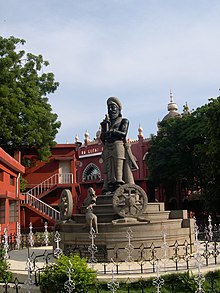Manu Needhi Cholan
| Ellalan | |
|---|---|

Statue of Ellāḷaṉ in the premises of Madras High Court in Chennai
|
|
| King of Anuradhapura | |
| Reign | c. 205 – c. 161 BC |
| Predecessor | Asela |
| Successor | Dutugamunu |
| Born | 235 BCE |
| Died | 161 BCE |
| Issue | Veedhividangan |
| Dynasty | Chola Dynasty |
| Religion | Hinduism, Shaivism |
Ellalan (Tamil: எல்லாளன், Ellāḷaṉ), (Sinhala: එළාර, Elara) was a member of the Tamil Chola dynasty, who upon capturing the throne became king of the Anuradhapura Kingdom, in present day Sri Lanka, from 205-161 BCE.
Ellāḷaṉ is traditionally presented as being a just king even by the Sinhalese. The Mahavamsa states that he ruled 'with even justice toward friend and foe, on occasions of disputes at law, and elaborates how he even ordered the execution of his son on the basis of a heinous religious crime. Ellāḷaṉ is a peculiar figure in the history of Sri Lanka and one with particular resonance given the ongoing ethnic strife in the country. Although he was an invader, he is often regarded as one of Sri Lanka's wisest and most just monarchs, as highlighted in the ancient Sinhalese pali chronicle, the Mahavamsa. According to the chronicle, even Ellāḷaṉ's nemesis Dutugamunu had a great respect for him, and ordered a monument be built where Ellāḷaṉ was cremated after dying in battle. Often referred to as 'the Just King'. The Tamil name Ellāḷaṉ means 'the one who rules the boundary".
Ellāḷaṉ is described in the Mahavamsa as being "A Tamila of noble descent...from the Chola-country"; Little is known of his early life. Around 205 BCE, Ellāḷaṉ mounted an invasion of the Rajarata based in Anuradhapura in northern Sri Lanka and defeated the forces of king Asela of Anuradhapura, establishing himself as sole ruler of Rajarata.
He has been mentioned in the Silappatikaram and Periya Puranam. His name has since then been used as a metaphor for fairness and justice in Tamil literature. His capital was Thiruvarur.
Despite Ellāḷaṉ's famously even-handed rule, resistance to him coalesced around the figure of Dutugamunu, a young Sinhala prince from the kingdom of Mahagama. Towards the end of Ellāḷaṉ's reign, Dutugamunu had strengthened his position in the south by defeating his own brother, Tissa, who challenged him. Confrontation between the two monarchs was inevitable and the last years of Ellāḷaṉ's reign were consumed by the war between the two.
...
Wikipedia
